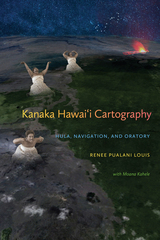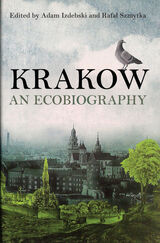3 start with K start with K

An important symbolic element in Hawai'ian cartography is the storied place name, which reflects Hawai'ian spatial knowledge of the environment. Many Hawai'ian place names performed in daily rituals were a conscious act of locating genealogical connections, recreating cultural landscapes, and regenerating cultural mores. They constitute a critically important body of Hawai'ian cultural knowledge. When Hawai'ian place names were incorporated into Western cartographic maps they were transformed epistemologically. They went from representing place as a repository of cultural knowledge to representing place as an object on the landscape. Hawai'ian spatial knowledge presentation is interactive, multi-sensual, and multi‐ dimensional.
Kanaka Hawai'i Cartography interweaves methodology with personal narrative and performance presentation in a playbill format. Three of the seven chapters are presented as “Acts” in a play. The remaining four chapters serve as intermissions or interludes together with a prologue and an epilogue for setting the stage and providing closure. To help make the topic more accessible, complex terms have been minimized, making academic theory easier for the educated reader to understand. The book will fill an important gap in Indigenous and Native Studies and will be welcomed by anyone interested in traditional Hawai’ian performance cartography.

Kinship to Mastery is a fascinating and accessible exploration of the notion of biophilia -- the idea that humans, having evolved with the rest of creation, possess a biologically based attraction to nature and exhibit an innate affinity for life and lifelike processes. Stephen R. Kellert sets forth the idea that people exhibit different expressions of biophilia in different contexts, and demonstrates how our quality of life in the largest sense is dependent upon the richness of our connections with nature.
While the natural world provides us with material necessities -- food, clothing, medicine, clean air, pure water -- it just as importantly plays a key role in other aspects of our lives, including intellectual capacity, emotional bonding, aesthetic attraction, creativity, imagination, and even the recognition of a just and purposeful existence. As Kellert explains, each expression of biophilia shows how our physical, material, intellectual, emotional, and spiritual well-being is to a great extent dependent on our relationships with the natural world that surrounds us.
Kinship to Mastery is a thought-provoking examination of a concept that, while not widely known, has a significant and direct effect on the lives of people everywhere. Because the full expression of biophilia is integral to our overall health, our ongoing destruction of the environment could have far more serious consequences than many people think. In a readable and compelling style, Kellert describes and explains the concept of biophilia, and demonstrates to a general audience the wide-ranging implications of environmental degradation.
Kinship to Mastery continues the exploration of biophilia begun with Edward O. Wilson's landmark book Biophilia (Harvard University Press, 1984) and followed by The Biophilia Hypothesis (Island Press, 1993), co-edited by Wilson and Kellert, which brought together some of the most creative scientists of our time to explore Wilson's theory in depth.

READERS
Browse our collection.
PUBLISHERS
See BiblioVault's publisher services.
STUDENT SERVICES
Files for college accessibility offices.
UChicago Accessibility Resources
home | accessibility | search | about | contact us
BiblioVault ® 2001 - 2024
The University of Chicago Press









